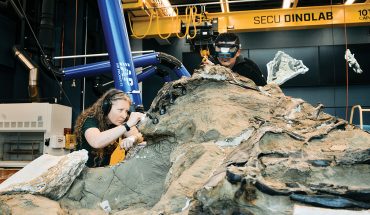by Lewis Beale
photographs by Geoff Wood
Colin Clarke is used to thinking big. This is no huge surprise, since the coach of the Carolina RailHawks has played in England’s first division, and for Northern Ireland in the World Cup. When it comes to the planet’s most popular sport, the coach of the Triangle’s professional soccer team has performed on the biggest stages imaginable.
But Clarke is also a realist. He understands that in this area, soccer takes a backseat to football, basketball and hockey. The sport just doesn’t get the media coverage and massive crowds of the other pursuits. Clarke’s solution? Win a league championship and put the RailHawks on the map.
That is what brought Clarke to the RailHawks’ home venue, Cary’s WakeMed Soccer Park, after a successful coaching career in Richmond, Va., Dallas, and Puerto Rico. He liked the stadium, newly expanded to seat nearly 10,000. He liked the first-class practice facilities, and the professionalism of the RailHawks organization. And after five years in sweltering Puerto Rico, he liked the area and the change of seasons. “It’s a nice place to live, and a nice part of the country,” says Clarke, who now lives here with his second wife and 11-year old son (he has three grown children living in England and Puerto Rico).
“Not only does (Clarke) have a lot of coaching experience at a high level in this country, he has a fantastic playing background, and has the ability to recruit and sign players,” says team president Curt Johnson. “And he understands we’re still in the growth mode in this sport, and our players are the best vehicles to grow the sport, so we need players who are community minded.”
Clarke, 50, grew up in Northern Ireland but left home as a teen to pursue a soccer career that ended with an injury when he was 29.
He owned a pub in England for a while, then returned to soccer in 1995 when a coaching job offer in Richmond presented itself.
Ever since, Clarke has found success at every stop – whether coaching in Major League Soccer, the top tier in the United States, or in the North American Soccer League, the division II professional league where the RailHawks compete.
“He’s definitely a tough coach, and expects things done a certain way,” says RailHawks team captain Floyd Franks. “He expects perfection out of his players, and you enjoy having that high standard.”
Clarke has seen a sport that was once an after-thought in the United States grow by leaps and bounds, particularly on the youth level. Some American players are now good enough to play in the top European leagues.
Clarke knows there’s nothing like the spectacle, energy, and athletic excellence of an international soccer match, with a stadium full of chanting fans watching top teams like Manchester United or Barcelona perform their on-field magic. But he also understands that is not the American experience.
“The big difference here is that your top, top athletes will play basketball or football because it’s where the money is,” he says. In other words, everyone knows who LeBron is. But Landon Donovan, the all-time leading scorer for the U.S. national team? Not exactly a household name.
So Clarke’s mandate is obvious – play exciting and winning soccer. Fill WakeMed Soccer Park with screaming, attentive fans. Recruit the best players available, even if that means traveling to Brazil, Central America or Europe to get them. “I think the style we play here is very, very good,” he says. “We try to play fast and quick. You want it to be pleasing to the eye, so fans are entertained. Enjoy it. It’s a fun game.”
So far, so good, says Johnson, the general manager. “We scored a lot of goals last year. We’re in the entertainment business, and his style is to attack and win games.”
Last year, Clarke’s first as head coach, the RailHawks made it to the NASL playoffs but lost in the quarterfinals. This year, they’re looking for bigger things. And bigger crowds. An April exhibition against a pro team from Mexico drew over 8,000 spectators, the largest attendance in team history. Is this a preview of the future?
Clarke hopes so. And he knows that as the game keeps growing, he’ll be riding the wave along with it. “The sport has come a long way since 1995, the start of Major League Soccer,” he says. “So think where it might be in the next 15, 20 years, when another generation has grown with it.”




